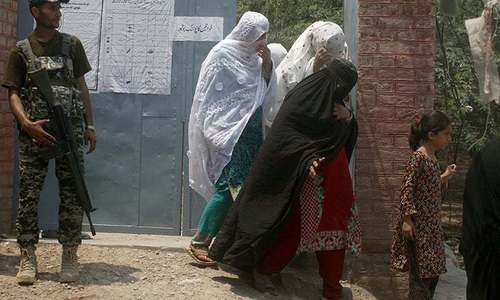YAKAGHUND: For 60-year-old Abdul Jalil, July 20 is a day of joy and celebration like over five million other residents of the erstwhile Federally Administered Tribal Areas (Fata).
“I feel that we (tribal people) spent 72 years in the hell and today is the beginning of a new life,” said Jalil, a resident of Yakaghund area in Mohmand tribal district.
He was sitting under a large canopy pitched outside a polling station, waiting for his turn to cast vote in the first-ever provincial assembly elections in his area.
“Today is the most important day for the people of tribal districts. There are many reasons for them to celebrate the occasion because they will have representation in the provincial assembly and will get rid of the corrupt administration, and there will be more development,” he told Dawn.
Read: Tribal districts take part in historic PA polls
The scene outside the polling station was full of excitement.
The candidates placed large-size canopies to protect voters from the scorching sun.
Say representation in provincial assembly promises uplift, removal of corrupt administration
Workers decorated the venue with flags of their parties and posters of candidates, while vendors sold ice cream, mobile phone SIM cards, and food items.
The polling began at 8am on Saturday. Elaborate security arrangements were seen inside and outside polling stations. Candidates arranged transport vehicles to provide pick and drop to voters.
After decades of neglect, the people of tribal districts got the historic opportunity to elect 16 members of the Khyber Pakhtunkhwa Assembly on general seats. Tribal people already have representation in upper and lower houses of Parliament.
Abdul Jalil gave the youths of former Fata credit for raising voice for their constitutional rights at every forum.
“We got representation in the provincial assembly because of the youths’ struggle,” he said.
The decision to bring millions of people of former Fata to the mainstream took over seven decades, while tribal people paid a heavy price for it. The reforms process began in tribal districts during Field Martial Ayub Khan’s Basic Democracy in 1959.
The populist prime minister, Zulfikar Ali Bhutto, initiated the development of infrastructure to fulfil basic needs of the people. He paid extensive visits to the area and launched projects through the defunct Fata Development Corporation.
President Farooq Ahmad Khan Leghari and caretaker prime minister Malik Meraj Khalid took one step forward by introducing adult franchise system in Fata in 1996. Before that, only selectedMalikswere allowed to elect members of Parliament.
President Asif Ali Zardari has the credit to extend the Political Parties Act to the region in 2010 allowing political parties to carry out activities, while the government of Prime Minister Nawaz Sharif got 25th amendment to the Constitution passed in parliament.
The 80-page report of the six-member Committee on Fata Reforms, 2016, headed by Sartaj Aziz paved the way for the merger of tribal areas with Khyber Pakhtunkhwa in July 2018 and the subsequent representation of the region in the provincial assembly despite the opposition of vested interests in political circles and establishment.
The PTI can be credited for fulfilling the dream by holding elections in merged tribal districts for the KP Assembly.
The eras of military regimes led by Ziaul Haq and Pervez Musharraf proved dark periods for the tribal people. The region experienced militancy, brutalities, drug trafficking, proxy wars, displacement and poverty.
The provincial assembly elections have made the residents of merged districts very optimistic about the future.
They hope that the polls will pave the way for good governance, provision of quality education to their children, improvement of health delivery system, and employment of youths. The post-merger era is a big challenge for the PTI government and state institutions.
“Former Fata was a grazing filed for the government officials because there was no audit of funds and accountability. Officers serving in the erstwhile tribal agencies were not answerable to anybody,” said Hassan Wali, former conservator (forest), who had served in tribal area for many years.
“This is a big achievement of the merger is that the Annual Development Programme for tribal districts has been increased from Rs21 billion to Rs83 billion and it will get Rs100 billion per annum from the National Finance Commission Award at the rate of three per cent,” he said, adding that the people’s destiny would change if development funds were utilised judiciously.
Published in Dawn, July 21st, 2019














































